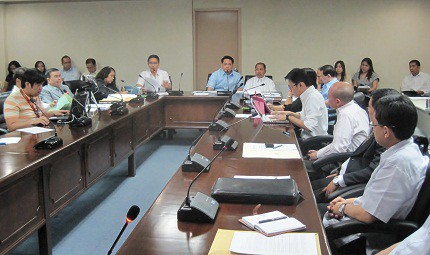
Commissioners of the National Telecommunications Commission (NTC), led by its chair Gamaliel Cordoba (middle, in blue shirt) preside in a public hearing Tuesday on the proposed circular requiring broadband data limit for consumers and minimum broadband speed for service providers. The event, which was held at the NTC main office in Quezon City, was attended by various industry stakeholders, including telcos, bloggers, and consumer advocacy groups. Photo by Melvin Calimag; Courtesy: GMANews.tv
Philippine consumers won a major victory this morning, successfully stripping language permitting Internet usage limits from a broadband reform measure before the country’s telecommunications regulator.
In a newly revised draft, this language written by and for some of the nation’s largest telecom providers was removed after a major consumer push-back:
“WHEREAS, it has been observed that few subscribers/users connect to the internet for unreasonably long period [sic] of time depriving other users from connecting to the internet; NOW, THEREFORE… Service providers may set the maximum volume of data allowed per subscriber/user per day.”
Consumer rights group TXTPower was instrumental in exposing the provider-written language and generating a groundswell of opposition to broadband usage limits. The group’s leader Tonyo Cruz said Internet Overcharging schemes like usage caps deliver all of the benefits to providers while limiting consumer access and increasing bills.
“The adoption of [usage caps] will destroy social media in the Philippines and affect businesses,” Cruz told commissioners at a National Telecommunications Commission public meeting attended by consumers.
Cruz compared broadband in the Philippines with a turtle race.
“Imposing caps would be like putting speed limits on slow-moving turtles,” he said. “It is one thing for telcos to say that a small percentage of consumers abuse their networks, but is another and more important thing to know whether they actually deliver the promised services and whether they have at the moment or in the future the capacity to deliver them.”
Cruz says his group doesn’t oppose providers dealing individually with consumers who use their accounts to the point of creating problems for other users on the network, but a blanket usage limit punishing every Filipino was unacceptable.
The issue rapidly became a political hot potato when ordinary Filipinos contacted their elected representatives to protest the measure.
Kabataan Partylist representative Mong Palatino put the Commission on notice: “NTC’s draft memo [including usage caps] is clearly anti-consumer and regressive. It tramples on the rights of the consumers to get what they pay for in terms of a reliable Internet service,” Palatino wrote in a widely distributed statement. “By allowing telcos and Internet Service Providers (ISPs) to limit Internet speed and connection, NTC seemingly wants the whole nation to regress to an Internet era that is much slower and highly unstable,” Palatino explained.
For Cruz, the entire argument for usage caps and the complaints about consumers using too much Internet service “ring weird.”
“The telcos who complain about over-use are the same companies actively encouraging consumers to use the Internet and become avid Internet users, to watch and upload videos and photos,” Cruz noted.
Cruz and other consumer activists want the Commission to hold additional public hearings, and stream them live over the Internet.


 Subscribe
Subscribe